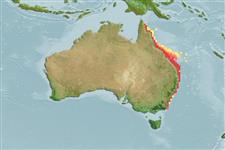Environment: milieu / climate zone / depth range / distribution range
экология
морской; солоноватоводный демерсальный; немигрирующий; пределы глубины 0 - 50 m (Ref. 6205). Subtropical; 12°S - 39°S, 143°E - 157°E (Ref. 6205)
Western Pacific: endemic to Australia. Records of this species from western Australia or northern Australia refer to Sillago burrus. Also very similar to Sillago aeolus from southeast Asia (Sunda Shelf). Occurrence in Tanzania (Ref. 2871) is probably a misidentification.
Length at first maturity / Size / Вес / Возраст
Maturity: Lm 19.0 range ? - ? cm
Max length : 30.0 cm TL самец/пол неопределен; (Ref. 6205); common length : 25.0 cm SL самец/пол неопределен; (Ref. 9679)
колючие лучи спинного плавника (общее число) : 12 - 13; членистые (мягкие) лучи спинного плавника (общее число) : 19 - 21; колючие лучи анального плавника: 2; членистые (мягкие) лучи анального плавника: 19 - 20; позвонки: 34 - 36. Anterolateral extensions of swim bladder recurved posteriorly to reach level of vent. Base of pectoral fin with black spot, back and sides with dark blotches. The upper and lower blotches are frequently joined, at least posteriorly, the upper blotches are generally larger; the opercle is dull or with an inner dark blotch showing through. Coloration is similar to S. burrus and S. aeolus.
Occur on silty and muddy substrates in the deeper water of bays, but also frequenting the mouths of rivers, estuaries, and mangrove creeks. Juveniles abound in estuaries and shallow water during summer, moving deeper as they mature. Diet of juveniles consist largely of small crustaceans and that of the adult fish consist mainly of polychaete worms and bivalve mollusks. Oviparous (Ref. 205). Spawn throughout the year with peaks in Dec.-Feb. (Ref. 6390). Marketed fresh (Ref. 9987) and chilled (Ref. 6390).
They spawn several times each year (Ref. 26745).
McKay, R.J., 1992. FAO Species Catalogue. Vol. 14. Sillaginid fishes of the world (family Sillaginidae). An annotated and illustrated catalogue of the sillago, smelt or Indo-Pacific whiting species known to date. Rome: FAO. FAO Fish. Synop. 125(14):87p. (Ref. 6205)
Статус Красного Списка МСОП (Ref. 130435)
Угроза для людей
Harmless
Использование человеком
рыболовство: не имеет хозяйственного значения; аквакультура (рыбоводство): экспериментальный; объект спортивного рыболовства: да
дополнительная информация
инструменты
Специальные отчеты
Скачать в формате XML
ресурсы в Интернет
Estimates based on models
Preferred temperature (Ref.
123201): 20.2 - 26.9, mean 25.1 °C (based on 98 cells).
Phylogenetic diversity index (Ref.
82804): PD
50 = 0.5000 [Uniqueness, from 0.5 = low to 2.0 = high].
Bayesian length-weight: a=0.00631 (0.00372 - 0.01070), b=3.10 (2.95 - 3.25), in cm total length, based on LWR estimates for this species & Genus-body shape (Ref.
93245).
Trophic level (Ref.
69278): 3.3 ±0.1 se; based on diet studies.
устойчивость к внешним воздействиям (Ref.
120179): высокий, минимальное время удвоения популяции до 15 месяцев (Preliminary K or Fecundity.).
Fishing Vulnerability (Ref.
59153): Low vulnerability (20 of 100).
Nutrients (Ref.
124155): Calcium = 349 [80, 974] mg/100g; Iron = 1.27 [0.47, 3.58] mg/100g; Protein = 20.9 [18.2, 23.2] %; Omega3 = 0.235 [0.104, 0.516] g/100g; Selenium = 20.5 [6.3, 76.8] μg/100g; VitaminA = 20.7 [4.0, 113.7] μg/100g; Zinc = 0.976 [0.489, 2.344] mg/100g (wet weight);
